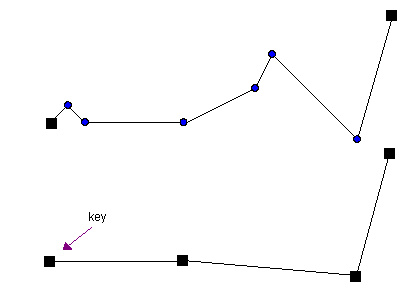Nth Point
The nth point routine is a naive O(n) algorithm for polyline simplification. It keeps only the first, last, and each nth point. All other points are removed. This process is illustrated below:

The illustration shows a polyline consisting of 8 vertices: {v1, v2 ... v8}. This polyline was simplified using n = 3. The resulting simplification consists of vertices: {v1, v4, v7, v8}.
The algorithm is extremely fast, but unfortunately, it not very good at preserving the geometric features of a line.
Interface
template <unsigned DIM, class ForwardIterator, class OutputIterator> OutputIterator simplify_nth_point ( ForwardIterator first, ForwardIterator last, unsigned n, OutputIterator result)
Applies the nth point routine to the range [first, last)
using the specified value for n. The resulting simplified polyline
is copied to the output range [result, result + m * DIM), where
m is the number of vertices of the simplified polyline. The return
value is the end of the output range: result + m * DIM.
Input (Type) Requirements
DIMis not 0, whereDIMrepresents the dimension of the polyline- The
ForwardIteratorvalue type is convertible to the value type of theOutputIterator - The range
[first, last)contains vertex coordinates in multiples ofDIM, e.g.: x, y, z, x, y, z, x, y, z whenDIM= 3 - The range
[first, last)contains at least 2 vertices nis not 0
In case these requirements are not met, the entire input range
[first, last) is copied to the output range
[result, result + (last - first)), or compile errors may
occur.
Implementation Details
Algorithms don't get much simpler than this. A loop is used to copy the first point and each following nth point of the input polyline to the simplification result. After the loop, I make sure that the last point is part of the simplification.
Usage
unsigned n = 10; // reduce to 10% std::vector <float> polyline; // original polyline, assume not empty std::vector <float> result; // resulting simplified polyline // simplify the 2d polyline psimpl::simplify_nth_point <2> ( polyline.begin (), polyline.end (), n, std::back_inserter (result));